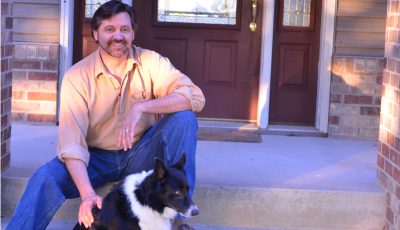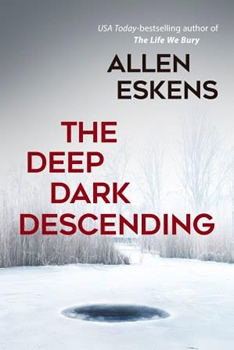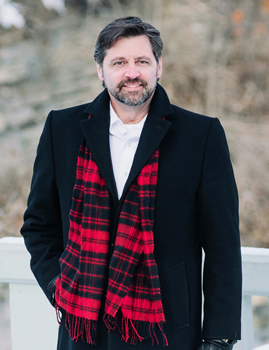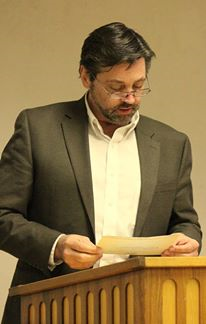

The Deep Dark Descending by Allen Eskens
Exploration of Vengeance
 By Wendy Tyson
By Wendy Tyson
We first met homicide detective Max Rupert in Allen Eskens’ award-winning novel The Life We Bury. In Eskens’ latest thriller, THE DEEP DARK DESCENDING, Max Rupert takes center stage as a man of the law grappling with a life-altering decision—whether or not to seek revenge against his wife’s killer. In its starred review, Kirkus says, “Eskens infuses the old this-time-it’s-personal trope with raw urgency, righteous indignation, and enough scorching action to melt every trace of the Minnesota snow in his finest hour to date.” The Big Thrill recently sat down with Eskens to talk about THE DEEP DARK DESCENDING, Max’s evolution as a character, and the exciting things in store for Eskens’ fans in the future.
Congratulations on your recent release, Allen. Please tell us what THE DEEP DARK DESCENDING is about.
THE DEEP DARK DESCENDING is my psychological beast. In this book I want to explore a particular facet of vengeance. All of my life, I’ve heard people say things like, “If anyone did that to my wife, I’d have no problem killing them.” But the question I ask is: would you really go through with it? If you were looking into the eyes of the person who killed your wife, and you had complete control of the situation, could you carry out that execution? One third of this novel takes place on a frozen lake on the Minnesota/Canada border where that question plays out.
In THE DEEP DARK DESCENDING, Max is hunting down the people who murdered his wife. This book looks at the internal struggle between justice and vengeance. Will a man who has stood for law and order and justice his whole life give in to the primal call for vengeance? Will he surrender to that dark descent?
As you note, homicide detective Max Rupert is struggling with some serious decisions—decisions that could forever alter the course of his life and change the way he sees himself. What elements of Max’s past have shaped the man he is today? How has his character evolved over the course of the series?
Max was first introduced to my readers as a secondary character in The Life We Bury. In that novel, he is a good cop, the kind of guy who saves the day, then tips his hat and says, “Just doing my job.” My next three books are an arc for Max’s character.
The first of those three books, The Guise of Another, has Max as a good brother in a good-brother, bad-brother story, where things happen that shake his faith in the system. Then in The Heavens May Fall, Max is haunted by the loss of his wife, and has to choose between following the rules and doing what he believes to be right. This causes him to question his fidelity to following rules—especially when he believes justice is served by breaking the rules.
By the third book, THE DEEP DARK DESCENDING, Max is in a struggle for his soul. He is battling his desire for vengeance and is being pulled to the darkest side of his nature. The three books are stand-alones, but read in succession one can see the journey that leads Max to that precipice.
In addition to THE DEEP DARK DESCENDING, you’ve written The Life We Bury, The Guise of Another, and The Heavens May Fall. Your work has been awarded a Minnesota Book Award, a Barry Award, a Rosebud Award, and the Silver Falchion Award, and you were a finalist for a number of other awards, including an Edgar Award and an Anthony Award. You’re a master at creating tension. In fact, Bookpage has called your work “compulsively suspenseful.” What attracted you to thriller writing? Are there certain themes you find yourself drawn to again and again?
As I was setting my course as a writer, I became drawn to mysteries and thrillers because I have a background in law. I resisted it for a long time, but it’s what I know. What I’ve tried to do, however, is use the mystery aspect of the novel as a vehicle to explore characters. My novels have deeper themes like guilt, redemption, forgiveness (and in THE DEEP DARK DESCENDING, justice vs. vengeance). The themes are born out of the character journeys. I want to pull my readers forward with a clever mystery, and draw them in deeper with my characters and themes. But in the end, it will always be about the hero’s journey for me.
Journalism, law…you have an interesting background. Please tell us about your career history. How does your role as a criminal defense attorney impact your writing?
Coming from a blue-collar background, I never thought of myself as college material. I barely got into college, but once there, I realized that I loved learning. I kept at it until I had my law degree, but I never really wanted to be an attorney. After law school, I started studying creative writing because I enjoyed it. I never thought it would be anything more than a hobby. But the more I engaged in that world the more I felt like I belonged there. Rainer Maria Rilke once said (and I’m paraphrasing here), ask yourself if you must write. After giving it serious consideration, if the answer is yes, then you should live your life accordingly.
That’s what pushed me to become a published author—I love to write. I didn’t set out to write mysteries and thrillers. My first notion was to write literary novels. But as a practicing criminal defense attorney, it seemed the natural path to take. After twenty-five years of practicing law, have no shortage of ideas and characters to draw from.
What does your writing routine look like? Do you have a favorite spot (or locale) from which to write?
I have been fortunate in my writing life to be able to have retired from the practice of law. Now I sit in my most comfortable recliner in my basement, next to my dogs, and type my daydreams into my computer. I spend at least six hours every day (including weekends when I’m up against a deadline) working on my manuscripts. The great part is (as the old adage goes) I enjoy what I’m doing, so it never feels like work.
What advice do you have for aspiring crime novelists?
If I could impart some advice, it would be this: give plenty of attention to the personal plot. My first novel, The Life We Bury, is actually two books rolled into one. It is a mystery, but it is also the story of a college student who ran away from home to find a life away from his autistic brother. If the mystery aspect of the novel hadn’t been there, this still would have been a good book. When I am outlining my novels, and I think that I have a good mystery plot down, I set that aside and start over and write the novel about the personal journey of the characters. When I am satisfied that I have a strong enough character story to make its own novel, I combine the two plots together.
What’s next for you, Allen?
There are some terribly exciting things on the horizon. The Life We Bury, my first novel, is being developed as a feature film by Mary Jane Skalski and Damon Lane of Next Wednesday Films, who are working with an established Hollywood writer/director on the adaptation.
I’m also currently working on the sequel to The Life We Bury, and I have my sixth book under contract, which will be a prequel of sorts. It will tell the story of Boady Sanden, one of the characters from both The Life We Bury and The Heavens May Fall, but it will go back to when he was an awkward kid in 1976.
*****
 Allen Eskens is the award-winning and USA Today-bestselling author of The Life We Bury, The Guise of Another, and The Heavens May Fall. A criminal-defense attorney for twenty-five years, he lives with his wife in Minnesota, where he is a member of the Twin Cities Sisters in Crime.
Allen Eskens is the award-winning and USA Today-bestselling author of The Life We Bury, The Guise of Another, and The Heavens May Fall. A criminal-defense attorney for twenty-five years, he lives with his wife in Minnesota, where he is a member of the Twin Cities Sisters in Crime.
To learn more about Allen, please visit his website.
Photography credit: Daniel Dinsmore
- Up Close: Tosca Lee and Marcus Brotherton - May 2, 2023
- Up Close: J. T. Ellison - February 28, 2023
- Up Close: J. J. Hensley - September 30, 2020


